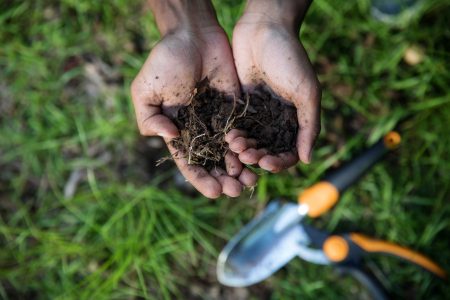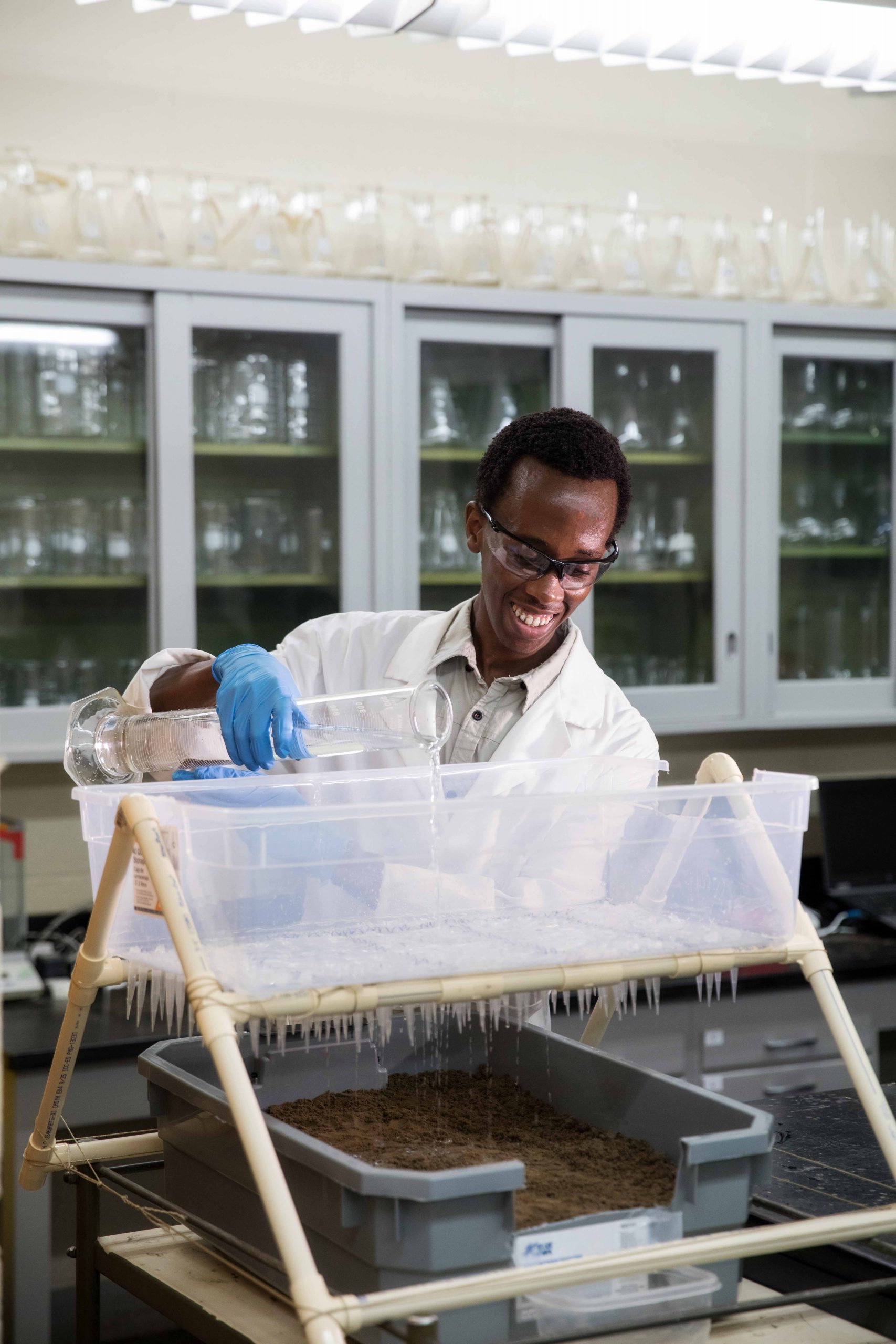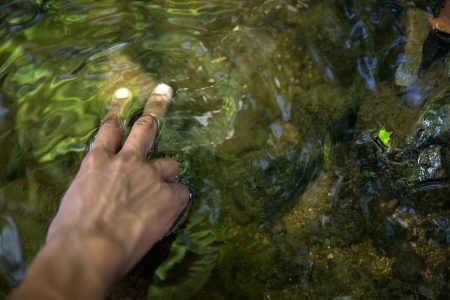Post contributed by Courtney Edwards, Auburn Global

Nelson outside with laptop
Growing up on a farm on the outskirts of Nairobi Kenya, Nelson Muthanji fell in love with nature and farm life at a young age. With a sparkle in his eyes, he described his childhood home where chicken coops lined the property, cows grazed, corn grew, and plants thrived in greenhouses.
Nelson shared, “Every morning I was up at 7:00 am to collect the eggs. Any of my friends would tell you that I spent most of my day on the farm. If I wasn’t doing farm work, I was sitting there just watching the chickens and all of the other animals… just taking it all in.”
This strong connection to nature and love of farm life followed Nelson as he left his hometown to study Environmental Science at Auburn. When he arrived in Auburn, Nelson was delighted to discover undergraduate research opportunities that catered to his love for nature and were directly related to his career aspirations.
 Nelson spent summer and fall of 2018 researching under the guidance of Dr. Rishi Prassad, Assistant Professor and Animal Systems Environmental Specialist in the College of Agriculture. Through this hands-on experience, Nelson learned about nutrient budgeting with a specific focus on farming with organic chicken manure. During several visits to Auburn University’s research extensions throughout Alabama, he met with local poultry farmers, toured their farms, shared research findings, and collected samples from the farms and surrounding environment and streams.
Nelson spent summer and fall of 2018 researching under the guidance of Dr. Rishi Prassad, Assistant Professor and Animal Systems Environmental Specialist in the College of Agriculture. Through this hands-on experience, Nelson learned about nutrient budgeting with a specific focus on farming with organic chicken manure. During several visits to Auburn University’s research extensions throughout Alabama, he met with local poultry farmers, toured their farms, shared research findings, and collected samples from the farms and surrounding environment and streams.

Nelson in the lab
“Dr. Prassad emphasized that forming relationships with the farmers was a crucial part of our research,” Nelson said. “We weren’t there just to introduce and enforce rules, we truly wanted to help the farmers however we could. We hoped that we could teach them things that would improve their farming practices and encourage them to practice sustainable farming methods.”
Dr. Prassad and his team worked together to educate farmers about “4-R Nutrient Stewardship,” which emphasizes the importance of the right source, right rate, right time, and right placement when using chicken manure to fertilize crops. Farming without taking “4-R Nutrient Stewardship” into consideration could lead to fertilizer runoff into nearby streams and water sources and the formation of harmful algal blooms, eventually disturbing or potentially devastating the local ecosystem.
Nelson explained, “When too much fertilizer or the wrong concentration of fertilizer is used, oftentimes excess washes off into streams causing alga blooms to form. If you see a lot of alga blooms, that means that there are way too many nutrients in the stream. If the water contains too many nutrients, this creates a feast for the algae causing rapid spreading and growth, eventually using up all of the nutrients and oxygen in the water source.”
He continued to explain that this can cause a chain reaction that impacts other organisms within the ecosystem.
 “If there are fish in the stream, this creates competition for the oxygen in the water and the fish die. Eventually, the algae die off because the oxygen levels in the steam have decreased dramatically,” he added. “When the algae decompose, that requires more oxygen, so eventually the water that is left is sorely oxygen deprived. It is all interconnected.”
“If there are fish in the stream, this creates competition for the oxygen in the water and the fish die. Eventually, the algae die off because the oxygen levels in the steam have decreased dramatically,” he added. “When the algae decompose, that requires more oxygen, so eventually the water that is left is sorely oxygen deprived. It is all interconnected.”
It is this type of knowledge, that goes beyond classroom instruction, that Nelson was hoping to gain when he came to study at Auburn.
“Farmers want to take care of what they grow and, generally, the surrounding areas,” Nelson said. “Sharing what we’ve learned about applying ‘4-R Nutrient Stewardship’ with farmers helps prevents damage to nearby water sources and can actually help the farmers as well.”
Nelson hopes to continue researching with other faculty members at Auburn to broaden his knowledge of water purification. One day, Nelson plans to return to Kenya and work for a NGO where he can use what he learned at Auburn to improve farming practices and, in turn, improve water quality.
While Nelson’s Auburn journey isn’t over, one thing is sure, he has already played a role in transforming the way farmers view their methods in Alabama and could one day transform farming methods in Kenya.




